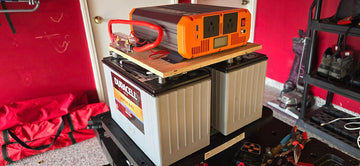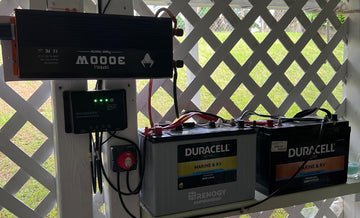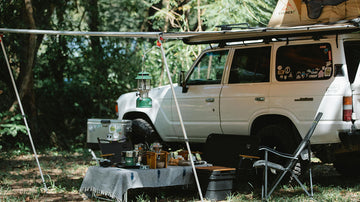Just because it's winter doesn't mean your adventures have to stop! Whether you're camping in your caravan or enjoying a day out in the great outdoors, one of the most important things you can do is have a reliable source of power. But it's well known that battery performance can suffer in cold temperatures and living off the grid can become dangerous. But can lithium batteries freeze and stop working?
In this article, we delve into the effects of freezing temperatures on lithium batteries and explore best practices for storing and using them in cold environments.
What happens to batteries in cold weather
Temperature is the most important of the many variables that affect battery efficiency. The role of a battery is to store and release energy. Cold weather can hinder these important functions. The capacity and discharge rate of a battery decreases as the temperature drops because the chemical reactions required to produce energy become slower and less efficient. Further degradation may occur during charging, and the mechanical stability of the battery is reduced, making it more susceptible to accidental failure. At extreme low temperatures, some batteries may be at risk of leakage, especially when reheated after being frozen.
Lithium battery performance in cold weather
Lithium batteries perform much better in winter conditions than other types of batteries, but cold weather can still take its toll on lithium batteries.
Lithium batteries generate electricity when lithium ions move from the negative electrode (graphite anode) to the positive electrode (cathode). In cold weather, this process slows down, reducing its power. As the temperature drops, the rate at which lithium ions move in and out of the anode decreases rapidly. The lithium ions simply cover the surface of the anode without inserting themselves into the carbon sites, reducing the amount of lithium ions available to generate electricity. As a result, current cannot flow and battery capacity is significantly reduced. Typically, lithium-ion batteries operate optimally at 98-95% of their rated capacity, but this can reduce their capacity by 20-30%. More importantly, it can cause short circuits, which can damage the battery by puncturing the battery separator.
According to the information in the table below, as the temperature decreases, alloy formation increases, which increases the plating rate. This plating not only reduces the number of lithium ions that can be inserted, but also slows the insertion rate.

Can lithium batteries freeze?
If you take the word 'freeze' literally, the answer is no. The electrolyte in a lithium battery remains constant and is not diluted, so it will not freeze at extremely low temperatures. In the lithium plating reaction described above, if the lithium ions are unable to pass through the anode, no current can flow, in other words, the battery 'freezes'.
In addition to reduced capacity, freezing temperatures can have a more damaging effect on some battery components. For example, the electrolyte hardens and does not circulate as well, reducing the transfer rate of lithium ions. Loss of capacity can lead to a reduction in battery voltage and power output.
In short, it is technically impossible to 'freeze' a battery, but freezing temperatures can also have a negative effect on lithium batteries. When exposed to cold temperatures, lithium ions will not move efficiently in and out of the anode and the battery assembly will not perform as expected.
Note: Although many types of lithium battery will continue to operate in sub-zero temperatures, it is important that they are not charged when the temperature drops below freezing. If your LiPo battery is likely to be used in sub-zero temperatures for an extended period of time, it must be heated to above 25°F before charging. Placing the battery in an insulated, heated area, using a heating pad or upgrading to an internally heated battery will allow you to use your LiPo battery safely in extremely cold temperatures.
When do lithium batteries go bad?
In order to use lithium-ion batteries in devices that operate within the appropriate temperature range, it is important to understand which temperatures are harmful to the battery, as temperature extremes can have a significant impact on battery performance and life.
Most lithium-ion batteries, including those used in consumer electronics and electric vehicles, perform best when stored between -4°F and 140°F, but should only be charged between 0°C and 55°C (32°F and 131°F) for safety. Below 0°C (32°F), the electrolyte in the battery becomes more viscous, which impedes the flow of ions and reduces the battery's ability to deliver power. In extremely cold environments, the capacity and voltage of the battery may also drop, resulting in reduced performance or even temporary failure.
As the temperature continues to drop, especially below -20°C (-4°F), the battery's ability to provide power is further reduced. At very low temperatures, lithium-ion batteries can suffer irreversible damage, such as the formation of a lithium film on the anode, which reduces battery capacity and can lead to safety issues.
To mitigate the effects of low temperatures on Li-ion batteries, some appliances and electric vehicles use heating systems to keep the battery within the optimal operating temperature range. This is particularly important in cold climates or in applications where the battery is exposed to extreme cold.
The effect of cold weather on battery performance also depends on several factors, including:
- Type and quality of battery material
- Design and construction of the battery
- State of charge and discharge of the battery
- Amount of time the battery is used in a cold environment
- Insulation and degree of protection of the battery
Does cold weather affect the life of lithium batteries?
Cold weather does affect battery life, even for lithium batteries. Temperatures below 32 degrees significantly reduce the efficiency and usable capacity of a lead-acid battery to 70-80% of its rated capacity. At the same temperature, lithium batteries can operate with very little loss, providing 95-98% of their capacity.
When charged at temperatures above freezing, the lithium ions in the battery are absorbed like a sponge by the porous graphite that forms the anode (the negative electrode of the battery). However, at temperatures below freezing, the lithium ions are not effectively captured by the anode. Instead, many of the lithium ions cover the surface of the anode in a process known as lithium plating, which means less lithium is available to generate electricity and the capacity of the battery is reduced. Charging below freezing at an inappropriate rate can also result in a battery that is less mechanically stable and more prone to sudden failure.
Under freezing charging conditions, lithium ions become disoriented as they 'work' inside the graphite anode. Instead of being inserted into the anode, these ions end up being deposited on the surface of the anode. Charging at freezing temperatures causes plating, which reduces battery capacity and increases resistance. If enough plating builds up, it can puncture the bulkhead and cause a dangerous short circuit inside the battery.
How to Keep Lithium Batteries Warm in Cold Weather
Winter is a season that requires extra care and effort to keep your lithium batteries warm in cold weather. Certain steps need to be taken to ensure that your lithium battery stays warm while you enjoy the winter months. Here are 5 great tips to keep your Lithium battery warm in cold weather.
1. Use a battery blanket. Battery blankets are insulating blankets used to keep batteries warm in cold weather. They are designed to fit snugly over the battery to prevent it from being exposed to cold temperatures. They provide good insulation by trapping the heat generated by the battery to reduce exposure of the battery cells to the cold, while protecting the battery from inclement weather.
2. Place the battery in an insulated storage unit or battery box. Insulated storage boxes and battery boxes are compact and reusable devices made from a variety of materials that are designed to keep lithium batteries warm by limiting the amount of cold air that comes into contact with the battery components. The insulating materials in them also help to retain the heat generated by the battery and provide additional warmth.
3. Use solar panels to charge the battery before leaving home in cold weather. Lithium batteries can discharge more quickly than usual in cold weather. It's a good idea to use solar panels to charge your lithium batteries before you go out. Solar panels are a great way to generate a steady, consistent stream of energy that will keep your battery charged and at the optimum temperature even on the coldest days.
4. Store lithium batteries in a heated area, such as a garage. Keeping your batteries in a heated area, such as a garage, will keep them functional and warm in cold weather. This will reduce the chance of your battery being damaged by cold temperatures.
5. Use a battery heater. Battery heaters are great for insulating lithium batteries and keeping them warm in the coldest conditions. Battery heaters designed for lithium batteries have adjustable temperatures and settings, and you can use them to ensure the longevity of your battery in cold weather.













